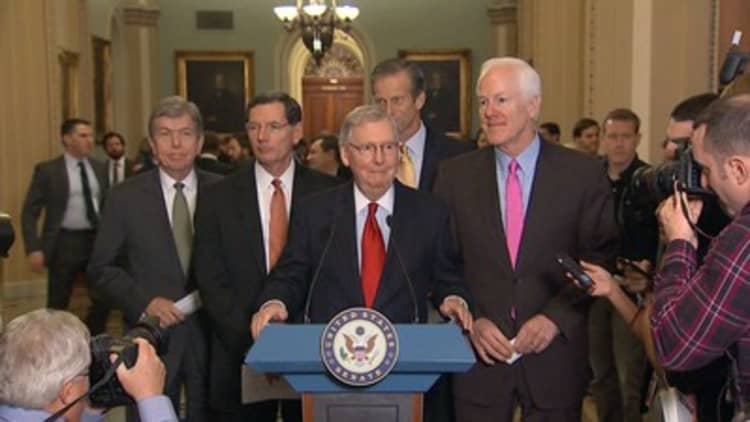
President Donald Trump has acknowledged that his tax plan will increase the budget deficit, if only for a short time.
In an interview with The Economist, one exchange features the president conceding that cutting taxes will have a negative effect on the shortfall. But he said it likely will be only for a year or two.
"It is OK, because it won't increase it for long. You may have two years where you'll … you understand the expression 'prime the pump'?" Trump said, according to a posted transcript of the interview.
The current fiscal year is expected to end with a budget deficit of $534 billion, $100 billion more than last year, according to the most recent projections from the Congressional Budget Office.
Years of government spending exceeding revenue have exploded the national debt to $19.8 trillion, $14.3 trillion of which is owed by the public. During the presidential campaign, Trump repeatedly denounced the culture of debt and deficits and promised to end it once he got to Washington.
However, his aggressive pro-growth plans include sharp tax cuts for both businesses and individuals on top of more public spending. Trump believes that the growth generated from reforms will help spur business out of its post-Great Recession funk.
The president and his interviewer engaged in an exchange over the term "prime the pump." It's a commonly used phrase in economic circles and refers to spending, usually at the public level, to get the economy moving again. In addition to the tax cuts, Trump has advocated what could be $1 trillion in spending on infrastructure projects.
The term also is used to describe the classic Keynesian approach, something more closely associated with liberal Democratic philosophy than the conservative Republican train of thought that Trump professes to follow.
Interestingly, Trump said he was unfamiliar with "prime the pump" in economic terms.
"Have you heard that expression used before? Because I haven't heard it," he said. "I mean, I just … I came up with it a couple of days ago and I thought it was good. It's what you have to do."
Doubts about big growth
Treasury Secretary Steven Mnuchin interjected during the interview that the administration believes its proposals can generate $2 trillion in revenue over the next decade.
"So priming the pump in the short term leads to growth," Mnuchin said.
How much growth has been a matter of debate.
Most economists believe that the Trump fiscal plans will get the economy above the 1.6 percent or so annual growth experienced under former President Barack Obama.
However, they doubt the administration will reach its targeted growth of 3 to 4 percent in the years ahead.
"There is little evidence to support the claim by (Mnuchin) that tax cuts
would pay for themselves by boosting economic growth to 3 percent or even higher, particularly not when the economy is already so close to full employment," Paul Ashworth, chief U.S. economist at Capital Economics, said in a note responding to the Economist interview.
"Rather than boosting sustainable economic growth, big tax cuts are more likely to result in a marked widening in the federal budget deficit, at a time when the debt burden is already high," Ashworth added. "The risk then is that rising debt could trigger a sharp increase in long-term interest rates, which would end up offsetting any of the potential benefits from lower taxes."
Still, Trump believes the goal is realistic, saying during that interview that "I happen to think that 3 percent is low."


